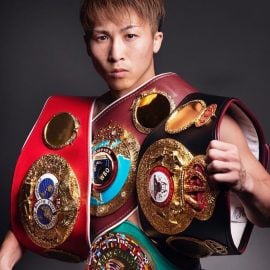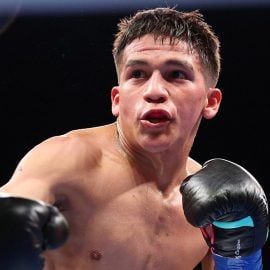Fighting Words — Undisputed Remains Disputed For One Night, And Even Longer
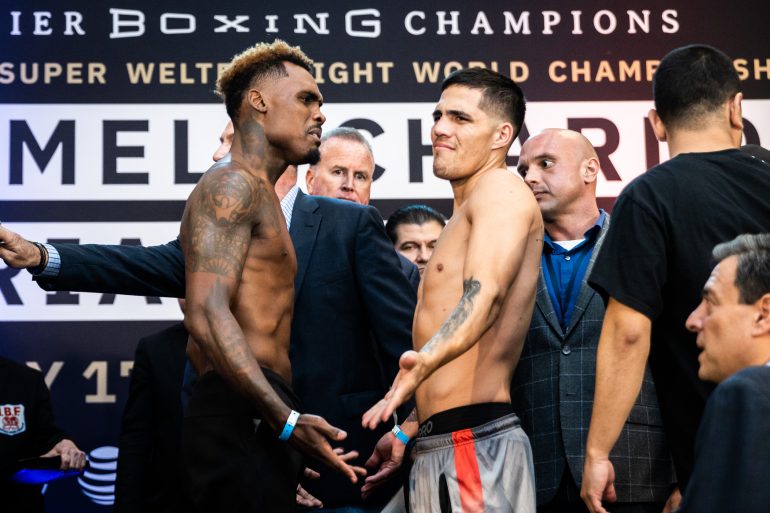
No matter what, there would have been plenty of reasons for Jermell Charlo and Brian Castaño to fight again.
They are two of the best junior middleweights in the world. They hold all four major world titles between them. The winner of their match would be crowned as the undisputed champ, a rare distinction in a sport that otherwise breeds confusion.
Their battle was befitting of their pedigrees — and the prizes on the line.
Charlo, who also holds The Ring Magazine championship at 154 pounds, hurt Castaño in the second round. Castaño buckled Charlo’s knees in the third. Castaño forced Charlo to the ropes and took the fight to him. Charlo sought to regain the center of the ring, get off first and take the fight back.
Castaño appeared to have the lead going into the final nine minutes — and, in this case, perception aligned with reality. But Charlo hurt Castaño in the 10th and swept the remaining rounds, saving his titles by one point thanks to a split draw.
Judge Steve Weisfeld had Castaño ahead, 114-113, seven rounds to five, with an additional point taken from Castaño for how hurt he was in Round 10, even without a knockdown. That is rare but not unheard of nor frowned upon, though Weisfeld was the only official judge to do so during Saturday’s main event.
It had no bearing on the ending. Judge Nelson Vazquez saw a completely different fight, scoring it 117-111 for Charlo, nine rounds to three. And judge Tim Cheatham had it even, six rounds apiece, 114-114.

Vazquez’s tally, of course, stuck out like a sore thumb. He was in the minority on three of the 12 rounds — he was the only one to give Round 1 to Charlo, Round 4 to Charlo, and Round 8 to Charlo. Had Vazquez seen those rounds the same as his colleagues, he would’ve had the fight the same as Cheatham.
Cheatham and Weisfeld were almost completely in agreement. They differed only on Round 6 (Cheatham had it for Charlo, Weisfeld for Castaño), and the scoring of the 10th round (10-8 from Weisfeld, 10-9 for Cheatham).
Had Cheatham scored Round 6 differently, then Castaño would’ve won with an incredibly close split decision. Then again, had he gone 10-8 in the 10th, then Charlo would’ve eked out the razor-thin victory.
Instead, we got a draw. The result of the first fight will result in a second fight.
That’s not the only reason why. The action and drama, the closely contested bout, were already ample enough justification to do it again. It didn’t matter who won. There was still gonna need to be two.
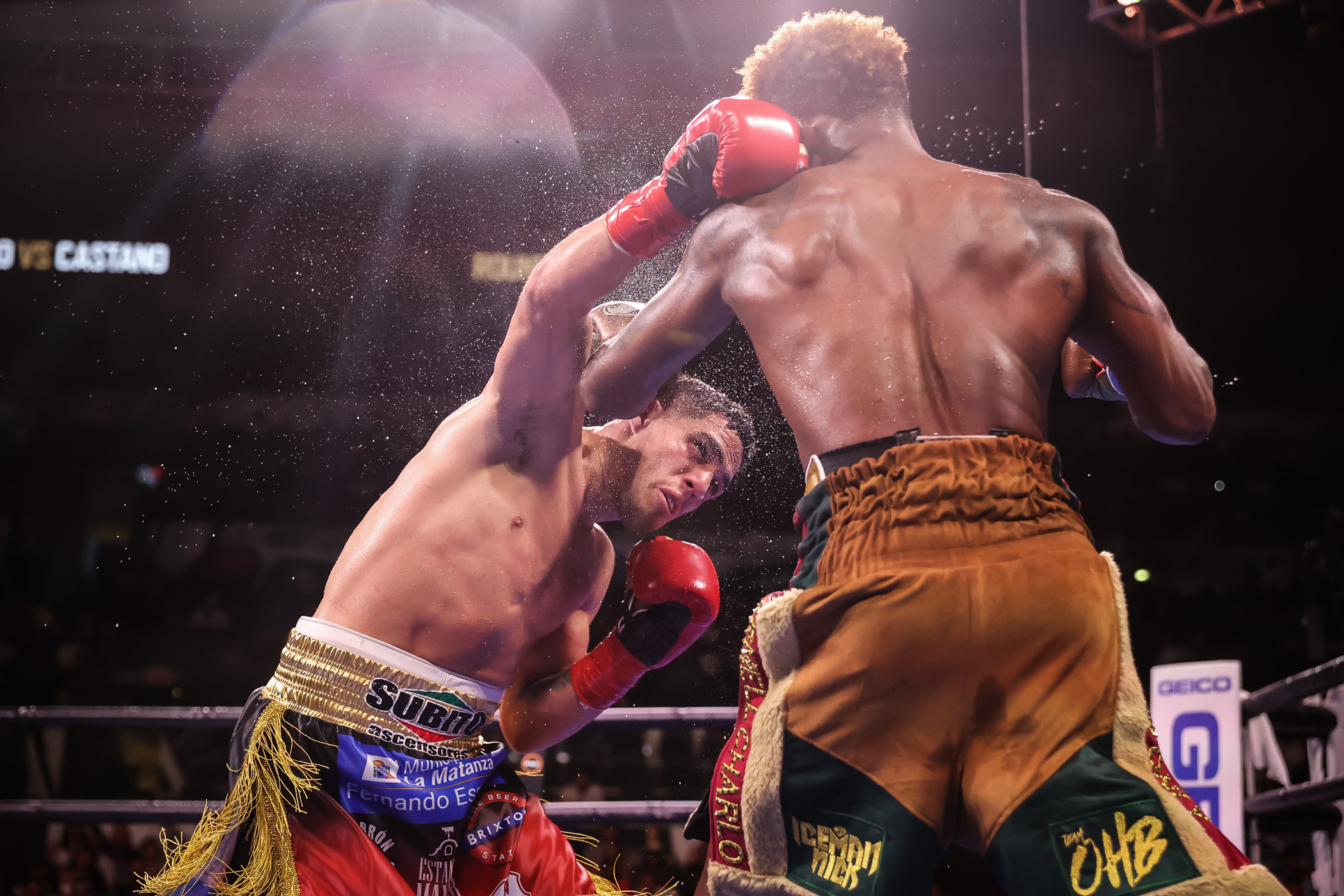
Photo from Showtime
The road to an undisputed junior middleweight champion — the first ever in the four-belt era, and only the sixth in all of men’s boxing in this era — is going to take a little bit more of a journey before we get to our destination.
Both fighters believe they won. Both otherwise agree that the fight was closer than Vazquez’s 117-111 scorecard. And both are interested in the rematch. Both teams believe they can do better the next time around.
“I think I knock him out in the rematch. I’ll be way more accurate, way more stronger … [my] confidence will be on a whole ‘nother level,” Charlo told Sean Zittel of FightHype.com shortly after the bout. In the press conference, he added: “I think I could’ve easily been a little more active. I stayed and kind of … waited on him to see what his move was going to be.”
Charlo’s trainer, Derrick James, recognized the differences in this first fight between when Jermell was on the ropes and when he wasn’t. James believes that will make a difference if there is to be a second fight.
“We can’t get on the ropes,” James told Zittel. “Because really the guy didn’t do anything other than … he tried to pizzazz the crowd. Can’t get on the ropes. Back him down. Just not giving up any ground. He only did what Jermell let him do. When Jermell came at him, what’d he do? … Have you ever seen Jermell Charlo fight on the ropes like that? The whole time?”
Then again, others might suggest that Charlo didn’t choose to go to the ropes, but rather was pressured there and often forced to remain there.
Castaño, meanwhile, said he’ll need to shore up his defense for any sequel and must be more careful on offense as well, including not coming straight in against Charlo.

Photo by Amanda Westcott/SHOWTIME
It was a good performance for Castaño, who had little experience against top-tier opposition. He and Erislandy Lara fought to a close draw in 2019. Earlier this year, Castaño won a wide decision over Patrick Teixeira to pick up the World Boxing Organization title.
On Saturday night in San Antonio, Castaño threw about half as many punches against Charlo (586) as he did against Teixeira (1,136). But he also landed more shots on Charlo than anyone else had before, according to CompuBox. He elevated his stature with this performance.
Charlo first won a world title five years ago, when he came from behind to knock out John Jackson. He’s continued to improve over the years, including a first-round stoppage of Erickson Lubin in 2017. There was a blip, a debated loss to Tony Harrison in late 2018, a debate that was rendered moot almost exactly a year later when Charlo stopped Harrison in the rematch to regain the WBC belt. Then Charlo added two more titles (IBF and WBA) last September when he stopped Jeison Rosario.
Charlo was 7-1 with 6 KOs in his last eight fights. That may have created an expectation that Charlo would overpower Castaño as well. Both men were able to take away some of what his opponent does well. In the aftermath of Saturday’s draw, some observers concluded that it was Charlo who had more room to improve. And if he could fight to a draw on a night where he didn’t perform at his best, then he could overwrite this blemish much as he did against Harrison.
That’s merely speculation with little other foundation. As we have seen in recent years in the junior middleweight division, there’s often a difference between what we expect to happen and what actually happens.
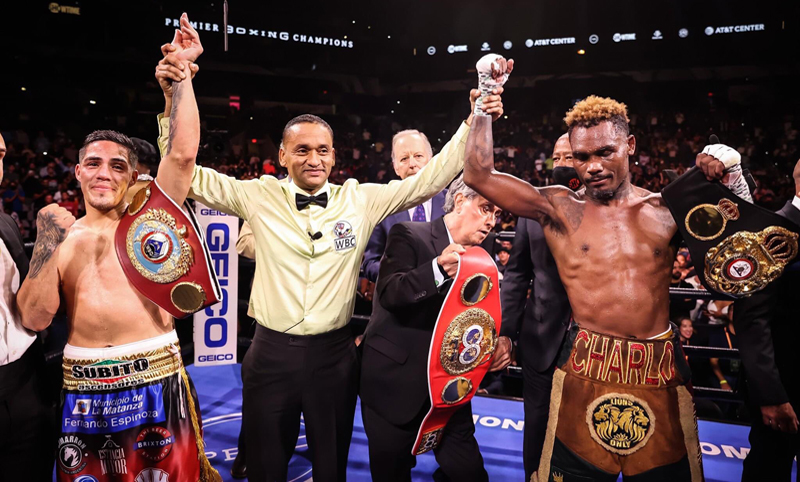
Photo by Amanda Westcott/Showtime
More on that in a moment. Because the other important element is whether the sequel to Charlo-Castaño is in the near future or further down the line. “Undisputed” remained disputed by the end of the night on Saturday. It could stay that way even longer.
“If both boxers want to do [a rematch], they both belong to PBC. The obstacle might be the sanctioning bodies’ mandatories,” said Sebastian Contursi, Castaño’s manager, in the post-fight press conference. “I’m not blaming them. They have their own rules. This was a very unique opportunity. If they can work out the mandatories, whatever they are. We don’t even know [who] we have the mandatory for the WBO, we were so focused on the unification. We would prefer unification like this and not any crap mandatory.”
Castaño’s mandatory opponent is Tim Tszyu, son of the Hall of Fame former junior welterweight champion, Kostya Tszyu. Tim, 26, is 19-0 with 15 KOs and has become a star in Australia.
Meanwhile, Charlo’s three belts have a few fighters in line. Lubin (25 years old, 24-1 with 17 KO) stopped Rosario last month and is the WBC mandatory, in position for a rematch with the man who took him out in 161 seconds.
The WBA has Erislandy Lara (38 years old, 28-3-3 with 16 KOs) as its “regular” titleholder, Michel Soro (33 years old, 35-2-1 with 24 KOs) as its “gold” titleholder, and Israil Madrimov (26 years old, 7-0 with 5 KOs) rated at No. 1, and honestly all of this gave me such a headache trying to figure out who would have to face who. Let’s move on.
The IBF mandatory is Bakhram Murtazaliev (28 years old, 19-0 with 14 KOs). He’s never defeated anyone of note.
All of this will shake out over the coming months, as the fighters, their managers, promoters, and the sanctioning bodies decide what will be best for their business. Perhaps it’s an immediate rematch between Charlo and Castaño. Or maybe there is an interim fight or two before the return bout.
In particular, Castaño vs. Tszyu and Charlo-Lubin 2 would make for fascinating pairings. And we’re still not mentioning many of the other names who were involved in the de facto round-robin that the 154-pound weight class has provided in recent years.
- Jermell defeated the likes of Lubin, Harrison and Rosario.
- Lubin lost in one round to Jermell but has wins over Terrell Gausha and Nathaniel Gallimore (who beat Rosario).
- Julian Williams lost to Jermall Charlo back when Jermall was also at 154, but J-Rock went on to beat Gallimore and Jarrett Hurd before getting knocked out by Rosario.
- Hurd beat Harrison (who was awarded a controversial win over Jermell in their first fight) and Lara, but was upset by Williams. Hurd recently lost to Luis Arias at middleweight.
- Lara beat Gausha, lost to Hurd and drew with Castaño. He recently won a secondary belt at 160 and may be staying there.
- Castaño drew with Lara and Jermell.
These fights has provided the junior middleweight version of boxing’s most famous “triangle theory” — Joe Frazier beating Muhammad Ali, then Frazier losing to George Foreman, then Foreman losing to Ali. In this case, there might be a dodecahedron rather than a triangle (look it up or find someone who plays role-playing games).
We’ve been doubly blessed at junior middleweight. There’s a depth of talent, and many of the fighters have been willing to face each other. There hasn’t been as much in the way of politics or business interests getting in the way.
Until now. And none of those potential obstacles has anything to do with the fighters’ desire for a rematch.
There are plenty of reasons for Jermell Charlo and Brian Castaño to fight again. Hopefully those outweigh the potential reasons that would keep them apart.
Their first fight was so close. It would be a shame if the second fight is too far away.
The 10 Count
1 – The draw between Jermell Charlo and Brian Castaño didn’t bother me — it was a close fight and my own scorecard had things very narrow at the end. But it was Nelson Vazquez’s 117-111 tally for Charlo that raised eyebrows and dropped jaws. It was that, not the draw, that drew ire.
It was the second time in less than a month that Vazquez turned in a card that seemed out of line with how his fellow judges, and plenty of other observers, had it.
“I didn’t like Nelson Vazquez’s 96-93 scorecard for Efefobor Apochi in his loss to Brandon Glanton in their war three weeks ago,” tweeted BoxingScene’s Jake “Jazz Hands of Stone” Donovan. “This was far, far worse. There’s just no path to giving Charlo nine rounds. This isn’t what we should be talking about after a fight like this.”
The other two judges in Apochi-Glanton had Glanton winning a close one, 95-94, separated by two rounds.
“Nelson Vazquez also scored Efetobor Apochi-Brandon Glanton 96-93 for Apochi in a fight Glanton clearly won,” tweeted Mark Ortega, a former boxing reporter who now works in TV production for boxing broadcasts. “When Nelson Vazquez scored Efe Apochi-Brandon Glanton for Apochi, he should have immediately been DQed from judging such an important fight until he showed again that he could competently score a fight. That’s how it SHOULD work in boxing, but it doesn’t.”
The thing is that Vazquez’s ridiculously lopsided score didn’t necessarily change the outcome. The other judges, Tim Cheatham and Steve Weisfeld, had it even at 114-114 and 114-113 for Castaño, respectively. Had Vazquez scored two more rounds for Charlo, the result still would’ve been a split draw. Then again, had a better judge than Vazquez been working ringside, they might very well have seen it the same way that Weisfeld did, giving Castaño the narrow victory.
It was reminiscent of another 117-111 score — that of Carlos Sucre in March’s rematch between Juan Francisco Estrada and Roman Gonzalez. His wide tally for Estrada stuck out like a sore thumb when compared to the other judges, who had it 115-113 for Estrada and 115-113 for Gonzalez.
“Two of the best fights of the year (Estrada-Gonzalez 2 and Charlo-Castano) have been marred by a batshit crazy scorecard,” tweeted Adam Abramowitz of Saturday Night Boxing.
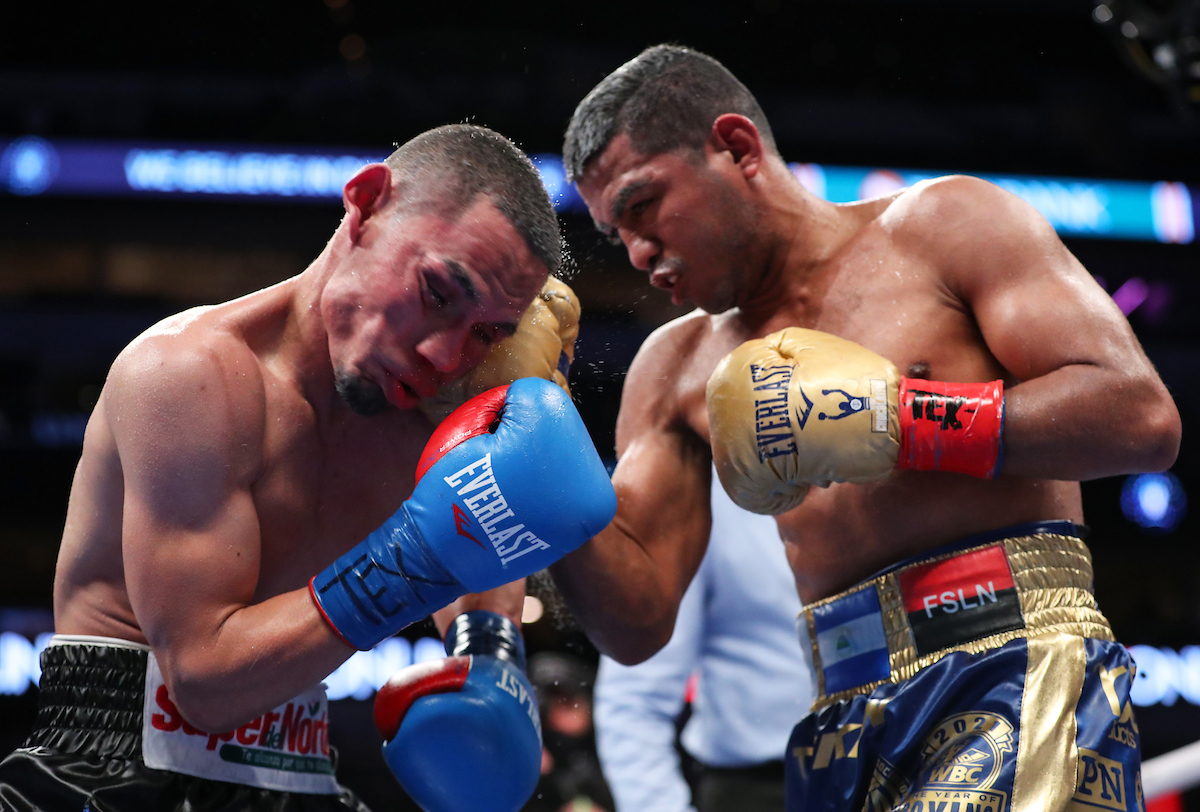
One judge thought Estrada-Gonzalez 2 was one-sided. Photo by Ed Mulholland/Matchroom.
2 – That scorecard from Nelson Vazquez rightly left people outraged and looking for answers — and outraged at the idea that they wouldn’t be able to get those answers.
“I wish they allowed us to interview the judges (and/or referees) after a fight,” tweeted Crystina Poncher, who works on Top Rank broadcasts. “I honestly don’t even know if there’s some sort of rule against it.”
Longtime boxing reporter Jake Donovan responded:
“Sadly, there actually is [guidance] for judges,” Donovan tweeted. “They are strongly discouraged from speaking with media and if so, to limit their answers to the four points of scoring criteria. At least it was that way for the ABC training seminars I’ve attended.”
Brian Campbell, who writes for CBS Sports and works for several broadcasters, also called for accountability:
“Boxing is going to boxing. We all know this. But if the sport doesn’t start making judges and athletic commission heads appear at press conferences to defend their actions, the clown show is only going to roll on,” Campbell tweeted.
And Eric Raskin sarcastically made the point that things wouldn’t get better:
“I’m sure the boxing commissions will hold Vasquez accountable and he won’t judge another fight for at least a week.
Everyone is right. It would be great if officials were made available to talk immediately after the fight or in the post-fight press conference.
Here’s the thing: Reporters don’t need to be at the mercy of judges and referees and ringside physicians being made available. They can make phone calls. They can make connections. They can show up at athletic commission meetings. They can keep asking questions. Some reporters do this already. But not enough.
Oh, and they should write stories every time someone refuses to talk. And then they should try again.
That’s what one newspaper I worked at would do every time a city government or a police department or another entity declined to talk on the record or release important information. It’s amazing what continued pressure can do when it comes to accountability.
3 – Boxers Behaving Goodly: A few days before Jermell Charlo met Brian Castaño in the ring, the unified junior middleweight titleholder spoke to more than 25 kids at the Boys and Girls Club of San Antonio, according to a press release.
“It’s super important to come out here for the children,” Charlo said, per the press release. “I was once in their shoes. These kids come from a lot of different backgrounds, and I’m here to inspire them to keep going for their dreams.
“It’s a big thing to be able to help inspire kids to stay off the streets or inspire them to want to work harder,” he added. “I hope that they just continue to try to become someone.”
The kids also received tickets to this past Saturday’s card at the AT&T Center.
“You could see the happiness inside their hearts that they’re going to be at the fights Saturday,” Charlo said. “That’s what it’s all about. You never know, going to a live event like Saturday could inspire one of them to become a boxer and feed their family that way.”
4 – I really like Showtime’s “Trainer Tracks” feature shortly after fights end, spotlighting audio from the fighters’ corners.
“You can control the pace with your legs and your jab, but you’re waiting on him,” said Charlo’s trainer, Derrick James, at one point on Saturday night. It was just one tidbit of an evening’s full of good advice from him.
“You have the best legs in boxing,” James said at another point. “Don’t go to the ropes.”
“He’s trying to steal the rounds,” James said. “You’re winning most of the round. He’s trying to steal the end of the round.
Good stuff. But there’s one good improvement for them to make:
Tell us between what rounds those quotes came from. It’s easy to do from a production standpoint. It’s just a small thing, and yet it would add such important context.
5 – Shortly after Showtime’s broadcast ended Saturday night, there was this advice from a trainer between rounds of the UFC show on ESPN:
“I want you on top all the time.”
I don’t recommend this as a pickup line…

Rolando Romero finishes off former world title challenger Anthony Yigit. Photo by Amanda Westcott/Showtime
6 – We boxing fans and observers often love to complain. We boxing fans and observers often have a lot to complain about. So let us take this moment just to appreciate what turned out to be an enjoyable tripleheader on Showtime on Saturday night. The show had promise on paper and delivered in the ring.
The opener between middleweights Amilcar Vidal and Immanuwel Aleem was a good brawl. The fan-friendly action continued with lightweight Rolando “Rolly” Romero dropping Anthony Yigit three times en route to a technical knockout win. And then we got an incredibly enjoyable fight between two of the best 154-pounders in the world.
That doesn’t make me any less upset about Nelson Vazquez’s scorecard, but Vazquez’s scorecard couldn’t ruin the night for me either given how much fun it otherwise was to watch.
7 – Why in the world is Andre Berto ranked No. 10 by the World Boxing Association?
(I mean, we know why — because the WBA.)
But somehow Berto entered their welterweight ratings as of June 30. Berto, who hasn’t fought since August 2018, sits three spots ahead of Keith Thurman, rated No. 13, who himself hasn’t fought since July 2019.
Thurman at least was a welterweight titleholder at the time and lost to Manny Pacquiao. You could argue that Berto is coming off a win, defeating Devon Alexander by split decision.
Again, that was nearly three years ago. If Berto didn’t deserve to be rated by the WBA before, then why now?
Here’s the funny thing: Berto wasn’t even ranked by the WBA entering the Alexander fight. Nor was he ranked by them immediately afterward.
Because this is a full-service boxing column — and because I have unresolved issues — I went through several years of the WBA ratings just for you.
You can thank me later. Or call my doctor. Or both.
Berto hadn’t been ranked by the WBA since the August 2015 ratings, back when he was the sanctioning body’s interim welterweight titleholder — because, again, the WBA. He’d “earned” that bauble by beating Josesito Lopez.
Berto then lost to Floyd Mayweather Jr. in what was then billed as Money Mayweather’s final professional fight. Berto was removed from the WBA ratings afterward.
By that point, Berto was no longer a top contender at welterweight. He’d lost to Robert Guerrero in 2012 and Jesus Soto Karass in 2013. He’d put together a pair of victories before the Mayweather fight.
Afterward, Berto stopped Victor Ortiz in their 2016 rematch. He didn’t remain overly active. Almost a full year later, he was stopped by Shawn Porter in April 2017. The win over Alexander came another 15 months after that.
It’d be good for the WBA to be forced to explain how Berto landed in the ratings. Who asked for him to return? Why was that request granted? How do you justify that spot for a fighter who hasn’t fought in three years, and hasn’t mattered in much longer?

Andre Berto. Photo by Naoki Fukuda
8 – George Bernard Shaw wrote Man and Superman.
Keep the World Boxing Association away from that, lest we end up with “Interim Man, Regular Man and Superman.”
(Dear readers, this is what you’ve long signed up for — the kind of boxing columnist who once compared Don King to King Lear, and whose editor wrote back the next day to say “No more Shakespeare.”)
9 – Rolando “Rolly” Romero followed his win over Anthony Yigit on Saturday night by once again calling out Gervonta Davis.
“I want Gervonta Davis at 140,” Romero told Showtime’s Jim Gray, who questioned whether Romero, now 14-0 with 12 KOs, has enough experience to take on Davis. Romero responded by referencing Davis’ record when “Tank” had his first title shot.
“I mean, what, he got it at 16-0? I have 14 now, so I’m ready for it. Time to stop him. I’ma knock him out. I know what he can do, but I know what I can do. I’m a lot stronger.”
Romero has largely been fighting at the lightweight limit or slightly above it since turning pro in late 2016.
“I need to go to 140. It’s my natural weight class,” Romero said, according to a press release from Showtime. “I feel I’ll be a lot stronger. I was at 135 for, what, four years now? It’s about time I move up.”
10 – Those of us boxing fans who are also boxing fans got a kick out of Anthony Yigit’s nickname — “Can You Dig It” Yigit” — and couldn’t hear it without thinking of WWE Hall of Famer Booker T.
Alas, I don’t think that Yigit has any chance of being a five-time, five-time, five-time, five-time, five-time champion…
Follow David Greisman on Twitter @FightingWords2. His book, “Fighting Words: The Heart and Heartbreak of Boxing,” is available on Amazon.
READ THE LATEST ISSUE OF THE RING FOR FREE VIA THE NEW APP NOW. SUBSCRIBE NOW TO ACCESS MORE THAN 10 YEARS OF BACK ISSUES.







